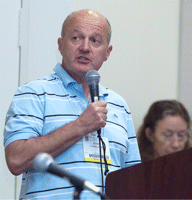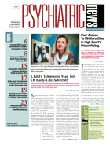Following the massive earthquake in Haiti in January 2010, psychiatrists employed by the Department of State played a crucial role in helping U.S. embassy staff through the months of crisis that followed, but not everything they did was therapy.
Shortly after the quake, David Johnson, M.D., M.P.H., chief of crisis response in the department's Office of Medical Services, traveled to the embassy in Port au Prince. He found not only massive physical devastation but an operation stretched beyond its limits.
"The embassy grounds were full of tents," Johnson recalled at APA's annual meeting in Honolulu in May. "The 150 foreign-service officers had lost their housing and possessions and were often living in their office cubicles, with no privacy, limited showers, and eating emergency rations."
All U.S. aid relief was channeled through the embassy, so on top of everything else, the staff had double or triple their usual workload.
The embassy also took on much of the responsibility for the 900 local Haitian staff employed by the embassy and their 3,000 family members. Many were staggered by the loss of homes, relatives, and friends.
The State Department employs 26 psychiatrists around the world and in Washington, D.C. (see
Mission Goes Global for State Dept. Psychiatrists). Overseas, each psychiatrist covers about 15 to 20 countries. They consult with ambassadors about mental health issues among embassy staff, conflict resolution, and responding to disasters and conflict zones.
Not unexpectedly, Johnson found that many of the staff were staggered by the quake. He saw acute stress reactions, sleep problems, somatic symptoms, irritability and anger, and thought disorganization. Many staff were dealing with grief and loss.
He instituted a psychoeducation program, using psychological first aid, suggesting treatment when needed, although most were not prescribed medications, he said.
Psychological first aid helps affected individuals feel safe, calms them down, and gives them a sense of self-efficacy and connectedness, Johnson explained.
"We taught practical coping strategies and tried to instill hope," he said. "We talked not about the traumatic event but about their response to it and how others were having the same reactions."
After Johnson returned to his post in Amman, Jordan, Mark Vanelli, M.D., took over in Port au Prince.
"There were few true patients, but there were a lot of people with chronic stress," he said. "They felt ground down."
This was a different phase in the life cycle of a catastrophe, Vanelli understood.
"Originally, we were dealing with individual trauma," he said. "Now we had organizational and institutional problems."
He concentrated more on group therapy with the foreign-service officers and less on individual therapy.
Normal embassy operations had nearly stopped, he noted. Work was slowed by the daily hardships of living plus the disrupting effects of temporary U.S. personnel working out of the embassy. Directives from Washington, D.C., headquarters changed frequently.
Part of any State Department psychiatrist's work is organizational, and Vanelli soon realized that all levels of the embassy staff needed some help.
To the ambassador and the top staff, he suggested a need to communicate better and be more visible to everyone else. "Good reliable information was a mental health intervention," he said.
Lower-ranking employees needed greater control over their daily work.
Everyone needed to take more time off, but the ambassador had to make that clear to all staffers. They needed time away from their desks but didn't take it because they felt they couldn't in light of the crisis.
Vanelli suggested that the ambassador let the whole staff leave a few hours early one afternoon a week—and lock the doors to make sure they took the time off. Teambuilding moments such as pot-luck dinners or town meetings could bolster a sense of community and buffer people against the effects of trauma.
He paired temporary personnel with experienced embassy workers to smooth integration of the former into staff operations.
He also asked top embassy officials to walk the halls and adopt a more hands-on management style. "We wanted them to focus on what could be changed, to set achievable goals, and to celebrate those short-term wins," he said. "A thank-you note from the ambassador goes a long way."
The insights gained by department psychiatrists during the Haiti crisis can be used elsewhere, after natural or man-made upheavals, Vanelli pointed out.
"For instance, they may be applicable to our embassies in the Arab world, where we can expect lots of high-stress work in the future," he said.

